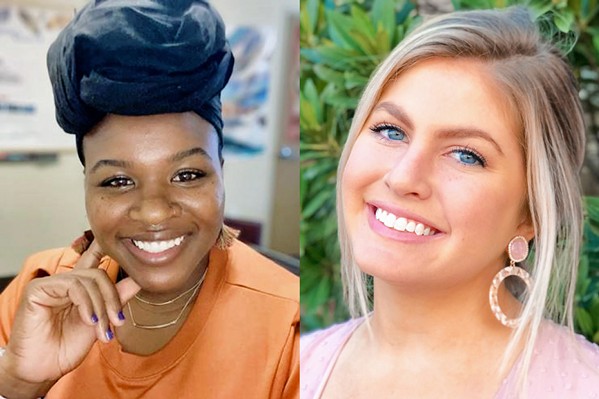
Normally, the holiday season is all about reuniting with family and friends, but this year is anything but normal.
With COVID-19 cases on the rise, the San Luis Obispo County Department of Public Health is urging residents who do choose to gather this year to do it responsibly and keep it brief, outside, small, and symptom-free. Some Central Coast families feel good about gathering, and others are getting creative.
Atascadero resident Katie Cramer is planning to host a Thanksgiving gathering of about 17 people, but she asked her guests to get a COVID-19 test if they're planning to attend. She said she's sure some family members "had some feelings" when she told them about the test, but they didn't express them.
"We have two high-risk family members that are really missing family time, and one that is pregnant (and is very cautious), so I don't feel like being tested is too much to ask," Cramer wrote in a Facebook message.
Cambria resident Shirley Bianchi said her family collectively decided to cancel family celebrations this year. The plan is to have a Zoom visit on Thanksgiving morning so her daughter and son-in-law in Germany can join in—virtual visits are something Bianchi does a lot these days.
"Our two local daughters and spouses will be here, but that makes just six of us, which is doable in our house," she said. "And we look forward to next year when we can hug, laugh, get re-acquainted with the great-grandkids, and have a wonderful, marvelous time with all of us in attendance."

- Photos Courtesy Of SLO County Department Of Behavioral Health
- RESPECTFUL DECISIONS SLO County Department of Behavioral Health's Kiana Shelton (left) and Caroline Johnson (right) share insights on how to talk about family festivities this year.
Making these decisions and having such conversations with family is completely new territory for everyone involved, Kiana Shelton told New Times. She's a licensed clinical social worker in the adult mental health program for the SLO County Department of Behavioral Health.
Shelton advises people to call out the newness of the situation in order to make it less uncomfortable.
"It's really reassuring to be in a space where everything is so new and how you choose to navigate it, there is no super right or wrong way because of the fact that none of us in our lifetime have lived this, except maybe the Spanish flu, but you would be in your 90s," she said.
What, how, and when you choose to say something is important, so Shelton's created what she calls "three radical R's": respect, reflect, and resign.
Radical respect, she said, gets a person in the right mindset for whatever conversation is about to take place.
"I think it changes the way we hold value to that conversation. A lot of the time we're quick to words just to fill space. I think more than anything this year has taught us that filling the space may not be what we need to do right now," she said, "but holding space is."
Radical reflection this year means hearing things you didn't necessarily want to hear, agree with, or expect to hear, Shelton said, but being able to take the time to reflect on it inwardly. She suggests asking yourself how that information impacts the way you have a relationship with someone who thinks differently than you.
"Does it mean that when I hold space with someone are there things we just resign or refrain from talking about?" she said. "We hold the capacity and ability to be able to navigate with people despite differences, whether we know them or not."
Radical resigning calls for self-awareness of what's necessary to continue participating or not—whether it's in a conversation or gathering.
"These are all really great emotional awareness skills that we practice more often than we know. When we start to move from a very mindful or radical space with these terms I think that it really shapes how we move in situations," she said. "It may actually give us more self-confidence and comfort in the decisions we make."
With her family in mind, SLO County resident Tori Keen is cooking a big dinner at home this year. Her family's usual plans are traveling to another family member's home to celebrate.
"Everything will be remote for us, because we have older people who are at risk and it's just not worth it to play the odds. I will be delivering them part of the dinner I cook, but all other interactions will be virtual," Keen said.
She said her family members who are older aren't entirely excited about the plan, but they understand the sentiment behind it.
Caroline Johnson, the SLO County Department of Behavioral Health's communications coordinator, wants to remind residents to carve out time for self-care. It means different things for everyone, Johnson said, but if you have to turn on Christmas music or put on a face mask, do it.
New Times Assistant Production Manager Eva Lipson said that her family talked about how they could safely see one another on Thanksgiving when they would all be traveling from different counties in California.
After a few conversations and reflection on how everyone was feeling—several family members were concerned—she took the plunge, called her brother, and canceled joining the celebration. She said her brother sounded relieved, and she's had less anxiety about the whole situation since.
"I told him I loved him and missed him and his family, and that I appreciated the effort they were going to put out to make this happen, but I thought we should wait until it was safer when we could love on each other, hug, and enjoy each other's company more," Lipson said.
Staff Writer Karen Garcia can be reached at [email protected].

Comments